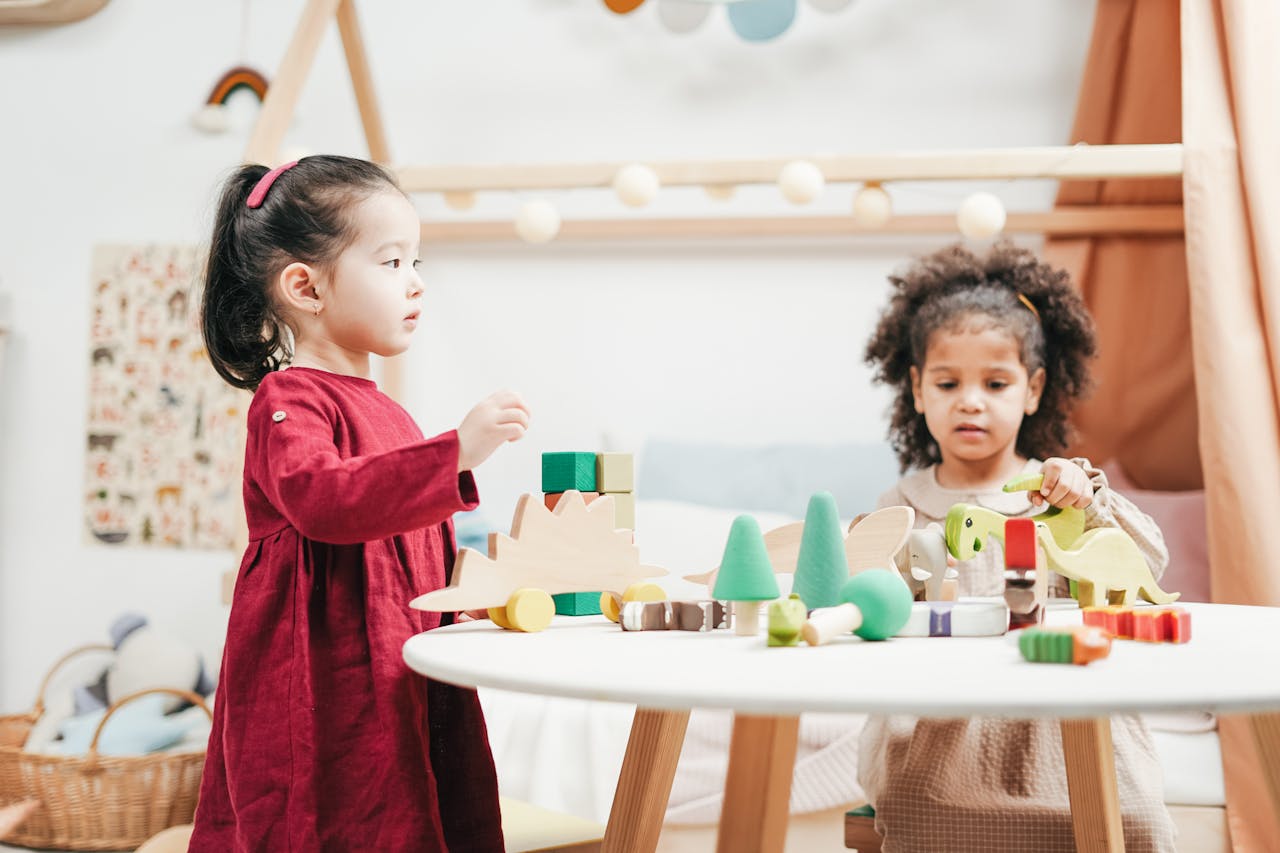The play-way method is the best way for your child to learn. Building blocks, acting as superheroes, and outdoor exploration help children develop essential skills while providing them with enjoyable activities. At Little Newtons, we believe that play-centered education promotes the natural and engaging development of problem-solving abilities along with creative thinking and social skills.
Play helps children develop thinking skills, communication abilities, and self-assurance. Group play teaches teamwork to children, while solo play activities build their imagination and decision-making abilities. Kids making their own choices through unstructured play holds equal value, if not more when compared to guided activities. Play-based learning stimulates children’s interest while keeping them engaged and eager to learn. Our blog provides deeper insights into how play-based learning in early childhood helps children develop holistically.

Play-based learning is one of the best learning methods for young children’s development and growth. Through each game and pretend scenario, together with hands-on activities, children learn to understand their world. Through this kind of learning, children gain the ability to explore their environment while developing critical skills by creating new ideas. Learning becomes an adventure that gives the child a space to thrive. Below are some reasons why this kind of learning method is important.
During playtime, your child practices problem-solving while making decisions and testing out their ideas. Through various activities for play based learning, like stacking blocks, solving puzzles, and running pretend stores, they gain an understanding of how things function. These playful activities build cognitive abilities like problem-solving and critical thinking, which are helpful throughout life.
By taking turns and sharing toys during games, children learn important teamwork and how to empathize with each other. Also, through play, they develop communication skills and learn to listen while building friendships with their peers.
Your child expresses their emotions during playtime. Through activities like storytelling with dolls and fort-building, children work through emotional responses, including excitement as well as frustration, and curiosity. They find a secure environment where they can express their emotions while simultaneously building self-assurance. This also makes them learn how to deal with various challenges.
Physical activities like running and jumping, along with smaller movements such as drawing and stacking objects, develop your child’s coordination and strength. Play helps children develop motor skills that enhance their movement abilities, hand-eye coordination, and balancing ability.
Children use play as their primary mode of communication before they develop the ability to speak in full sentences. When toddlers use toy phones to have conversations or preschoolers create stories with dolls, they lay the groundwork for language skills. These activities help them gain language skills that enable them to grasp new concepts and build social connections.
These activities teach children that objects and actions can symbolize something else. A basic box transforms into various objects like a car, boat, or castle. This imaginative thinking is closely linked to language, where words represent objects, actions, and emotions. The pretend play activities children engage in help them build skills necessary to both understand and use words.
Playful interactions provide opportunities for children to learn new words. As children act out roles in pretend grocery stores or play doctor alongside their friends, they discover language through constant repetition and experimentation. Through play experiences, children develop increased confidence in expressing their thoughts and feelings via a developing vocabulary.
During play, children not only engage their creative imagination but also develop important connections with others. When children play together, they develop essential social skills such as turn-taking and active listening. Through play-based activities children learn to express their thoughts and communicate their emotions in a natural way.
Our Little Newtons teachers create spaces where learning happens naturally. Every corner of the classroom generates curiosity which motivates children to explore their surroundings and engage in creative activities as well as experiment with new experiences. Every area is set up to invite hands-on learning.
The teaching staff also supports play activities through their active involvement by questioning students and introducing fresh concepts. They encourage independent thinking by not giving answers but rather guiding students to find their own solutions. Through group activities in the class, children learn to work together, share, and express their feelings. And so, in this way, teachers help them build friendships and self-assurance.
A study by UNICEF shows that when children play, they’re building skills. They benefit from this learning method as it stimulates their cognitive development and helps them explore their environment. These activities become learning opportunities, teaching them cause and effect while building teamwork and language or even early math skills.
It also builds confidence. Through free play, children learn to decide independently while taking risks and solving problems without adult guidance. A lack of rigid rules enables children to develop self-trust and problem-solving abilities.
Play also prepares children for their future life. UNICEF study indicates that play-based learning develops children’s ability to adapt to different situations and think creatively. It also teaches them important life lessons that will benefit them throughout their lives.
At Little Newtons, we bring play-based learning to life through engaging, everyday activities for each of our age-specific programs. Here are some play-based learning examples:
Play shapes your child’s learning journey by fostering creativity, problem-solving, and social skills. At Little Newtons, we nurture curiosity through hands-on experiences that make learning exciting. Join our community of like-minded parents and educators, and give your child a strong start in a place where play and education come together. Schedule a tour today and discover how our learning-focused daycare can help your little one thrive.
Image by cottonbro studio is licensed with Pexels License